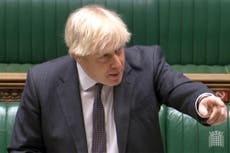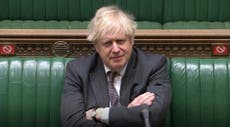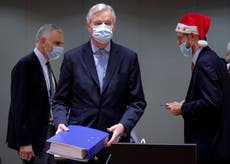Brexit: Theresa May tells MPs that her deal was better than Boris Johnson’s
Former PM urges successor to go back to the negotiating table to get better deal for services
Your support helps us to tell the story
From reproductive rights to climate change to Big Tech, The Independent is on the ground when the story is developing. Whether it's investigating the financials of Elon Musk's pro-Trump PAC or producing our latest documentary, 'The A Word', which shines a light on the American women fighting for reproductive rights, we know how important it is to parse out the facts from the messaging.
At such a critical moment in US history, we need reporters on the ground. Your donation allows us to keep sending journalists to speak to both sides of the story.
The Independent is trusted by Americans across the entire political spectrum. And unlike many other quality news outlets, we choose not to lock Americans out of our reporting and analysis with paywalls. We believe quality journalism should be available to everyone, paid for by those who can afford it.
Your support makes all the difference.Theresa May has told the House of Commons that her trade deal with the EU was better than the one eventually struck by Boris Johnson.
The former prime minister said that she would vote later today in favour of the EU/UK Trade and Cooperation Agreement reached by her successor on Christmas Eve, but told MPs that she had offered them a “better deal” in 2019.
And she took a swipe at hardline Brexiteers on the Tory backbenches who judge the success of a deal by the extent to which it frees the UK from entanglement in multilateral organisations like the EU, declaring: “Sovereignty does not mean isolationism.”
Ms May said she was “disappointed” in the deal Mr Johnson has reached on services and his failure to achieve the “groundbreaking” settlement for the financial sector which she had promised. She urged him to return to the negotiating table and fight for better arrangements for the sector which makes up 80 per cent of the UK economy.
“We have a deal in trade, which benefits the EU, but not a deal in services, which would have benefited the UK,” she told MPs.
Ms May also raised concerns about the security arrangements in Mr Johnson’s deal, which she suggested could harm the fight against modern slavery and child abduction.
And she said that the complex structure of joint committees and panels constructed to oversee the implementation and interpretation of Mr Johnson’s deal ”without any formal reference to this parliament” meant that the Christmas Eve agreement would not “excise the EU from our lives”.
Despite her misgivings, she urged MPs to back the Bill ratifying the deal. In an apparent reference to the rebellions which forced her from power, she said it was time “to push aside personal and party political interests, which sadly too many have followed in the past” in favour of the national interest.
Ms May’s proposed deal, which would have seen the UK remain temporarily in the EU’s customs union, was rejected by hardline Tory Brexiteers as “Brexit in name only” and triggered the resignation of Mr Johnson and David Davis from her cabinet.
After a succession of humiliating Commons defeats at the hands of Tory rebels and opposition parties, she resigned and saw her former foreign secretary replace her in 10 Downing Street.
Speaking in the one-day debate on the Bill ratifying Mr Johnson’s deal, Ms May said she had heard with “incredulity” that Labour was now planning to vote in favour of the PM’s agreement with Brussels.
The former PM said: “I welcome this deal and I will be supporting it today and I welcome the fact that the official opposition will be supporting this deal.
“But I did listen with some incredulity to what the leader of the opposition said.
“He said he wanted a better deal. He had the opportunity in early 2019, when there was the opportunity of a better deal on the table, and he voted against it.”
Ms May said that the zero-tariff, zero quota arrangements which Mr Johnson boasts of as the main achievement of his deal were already contained in the political declaration which she agreed with Brussels in 2018.
And she raised concerns about the security aspects of Mr Johnson’s deal, which denies the UK direct access to EU crime-fighting databases, such as the Schengen Information System II for security and border management.
“I hope in operational terms, in practice, we will see little change to the ability to investigate as a result of the good relationships which have been built up, but I do say that I think the EU has made a mistake in not allowing us access to SIS II,” she told MPs.
“I think that is something where we should aim to find some resolution of in the future, because it is an important database, it does help us in our fight on modern slavery and child abduction and identifying criminals across our borders.”
Ms May added: “One area where I am disappointed in the deal is in services. It is no longer the case that UK service providers will have the automatic right of access to provide services across the EU. They will have to abide by the individual rules of state.
“And the key area is financial services. In 2018 in Mansion House I said that we wanted to work to get a financial services deal in the future treaty arrangement, and that that would be truly groundbreaking. It would have been. But sadly it has not been achieved.
“We have a deal in trade, which benefits the EU, but not a deal in services, which would have benefited the UK.”
Despite Mr Johnson’s calls for Britain to move on from Brexit, she called on the government to resume negotiations “with alacrity and vigour” to improve the UK’s position on services.
In comments apparently aimed at the hardline Brexiteers who made her premiership a misery, Ms May said: "Sovereignty does not mean isolationism, it does not mean we never accept somebody else's rules, it does not mean exceptionalism.
“And it is important as we go forward that we recognise we live in an interconnected world.
“And if the United Kingdom is going to play the role that I believe it should play in not just upholding, but encouraging and promoting the rules-based international order and in ensuring that we promote the interests and value and strengthen multilateral institutions like the World Trade Organisation, we must never allow ourselves to think - as I fear some in this House do - that sovereignty means isolationism.”





Join our commenting forum
Join thought-provoking conversations, follow other Independent readers and see their replies
Comments